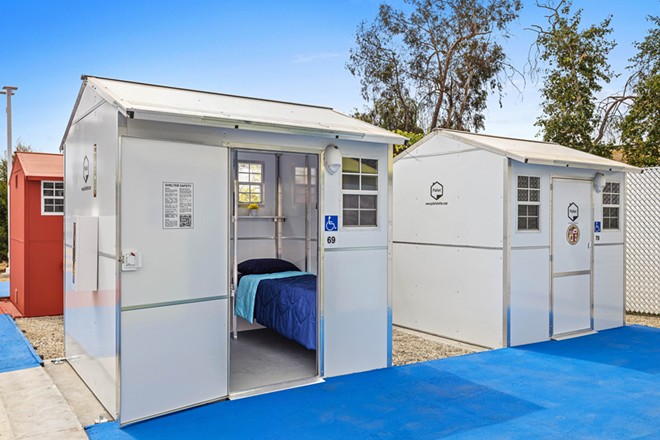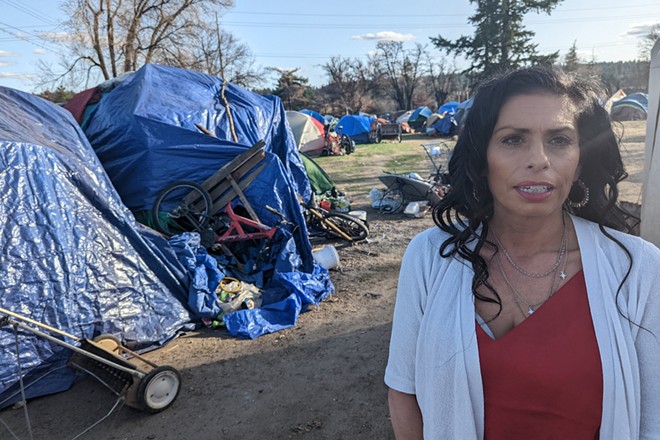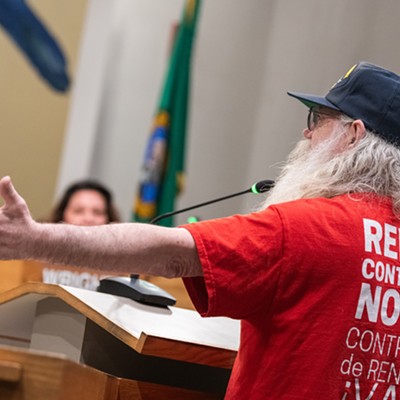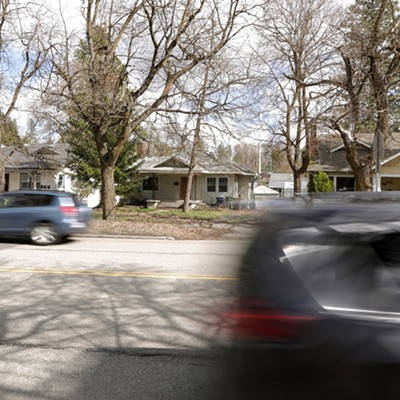
Wisps of smoke rise from the middle of a field in East Spokane on a Friday afternoon, as a man with a grizzled beard sits on half a couch and tries to cook canned food over a campfire.
A little over four months ago, Camp Hope — a homeless shelter and protest in front of City Hall — relocated to this encampment across I-90 from Fred Meyer near Freya Street.
Today, the site has exploded into one of the biggest tent cities Spokane has ever seen, with over 300 estimated residents. More than a hundred tents sprawl across the property, joined by ramshackle RVs and beaten-down cars with crumpled doors, filled with sleeping bags and other provisions.
Julie Garcia, co-founder of the often-controversial homeless service provider Jewels Helping Hands, points to how little trash is on the ground as proof that the people here really do care about making this community work.
But she also knows there have been serious challenges, like two fires on the property. She knows the fire department would prefer the campers not light fires at all.
"The problem is, what's the alternative?" Garcia says. "The reality is they have to stay warm."
There are "No Trespassing" signs here, but without an alternative place to house these people, the owner of the property, the Washington State Department of Transportation, hasn't wanted to kick them out.
"They're not going to move them if there's no space for them to go," Garcia says.
In March, the city of Spokane put out a call for operators to apply to run a proposed permanent emergency shelter space with at least 250 beds.
But there's a problem: Garcia argues that the vast majority of the chronically homeless people at Camp Hope are people unwilling or unable to stay in a traditional homeless shelter, except during the coldest weather. Some of them were banned by local shelters like House of Charity years ago. Others object to shelter curfews or say they don't feel safe, citing experience with robberies or assaults.
"I've had a lot of things happen to me in shelters," says April Pierce, a homeless woman holding the leashes for two dogs at Camp Hope. "I would rather be on the street, on the sidewalk, in 30 other different places, rather than the shelter."
So last week, Jewels Helping Hands submitted a longshot alternate proposal: Hope Village. They'd join forces with former City Council President Ben Stuckart and a wide variety of local service providers, including City Gate, Family Promises and Truth Ministries. And instead of the pressure-cooker environment created by one building, they'd have more than 250 individual low-cost tiny houses from a company called Pallet, where a single homeless person or a couple could stay.
The Inlander asks Pierce if she'd be willing to stay in one of those spaces.
"In a heartbeat," she says.
From the outside, Pallet shelters, built by a company based in Everett, look like little more than sheds with windows. But while they're tiny, at 64 square feet, they come with essentials: a bed, heating for the winter — no need to light dangerous fires outside — and, optionally, air conditioning in the summer. And the doors can lock, giving the guest a feeling of security at night, and the trust that they can leave their possessions during the day.
Tiny homes, of course, aren't new. The Pallet difference, company spokesman Brandon Bills says, comes down to speed and scale.
"They're built panelized, kind of like Ikea furniture. They're assembled in about 30 minutes each... We're building between 50 and 100 cabins a week," says Bills. "We say no one should go unsheltered when a village can be built in a day."
Over 70 communities have created Pallet shelter villages, including Everett and Moses Lake.
In fact, just last year, Mark Richard — then president of the Downtown Spokane Partnership — told the Inlander that he had encouraged the Spokane to look into Pallet homes shelters as a real possibility.
"These are small, safe, heated units where a person with a pet and a significant other can go," Richard said at the time. "They deserve a secure place, just like the rest of us do."
He also pointed to the fact that the shelters could easily be disassembled. That meant that if, for whatever reason, the shelters didn't work in one location, they could be moved or repurposed.
Richard said he'd talked about it informally to both Mayor Nadine Woodward and City Administrator Johnnie Perkins. In an interview in February, however, Woodward said she'd never heard anything about Pallet shelters from the Downtown Spokane Partnership.
Sheldon Jackson, a local downtown property owner fed up with the city's failure to address homelessness and property crimes, has seized upon the Pallet homes as an area where he agrees with Garcia — even looking into the possibility of building similar units himself.
"I think it's a great idea," Jackson says. "I think you're going to find that we can build these things so much cheaper than we can build shelters — and faster."
The first round of Pallet shelters in Everett opened in July 2021. Julie Willie, Everett's community development director, says they've been successful enough that they're about to open another round. She says the city was able to persuade neighborhoods to accept nearby Pallet villages, often the biggest hurdle to opening a shelter, by pairing them with localized restrictions on camping and sleeping in the area.
"I had one businessman tell me, 'This is the best thing that's happened to my business in 40 years,'" Willie says.
And, yet, for all the promise of Pallet homes being a place where homeless couples could stay together, in practice Willie says that didn't work very well. Some couples had been together out of necessity — they needed someone to watch their stuff while they were away. Once the lockable Pallet homes gave them additional security, their relationship dissolved. The cramped quarters probably didn't help.
"It's only 64 square feet," Willie says. "The most loving couple could probably not handle that."
So there are rules at the Pallet home village in Everett: No guests staying in the units. No on-site drug use. You can bring your existing pet but cannot get additional pets. And these kinds of rules mean that there are some people who would rather sleep outside than accept those kinds of restrictions.
And Willie cautions that cities should be careful about, say, trying to launch 300 Pallet shelter units at once. The buildings may be inexpensive (roughly $5,500 to $10,000 per unit), but the amount of staffing required to run the camp effectively — and to help transition people out of the temporary Pallet shelters and into permanent homes — isn't.
"Intensive case management is absolutely mandatory," Willie says.
After all, these units don't have toilets, running water or a kitchen. They're intended to help stabilize homeless people until they're able to transition to more permanent housing. But that's only possible if that housing exists. In Spokane, it doesn't.
"There is nothing more permanent than a temporary solution — like Pallet homes — if there is not an adequate supply of affordable housing," says Meg Martin, executive director of Interfaith Works, a homeless shelter operator in Olympia.
Garcia says she doesn't think the city is seriously considering Jewels' Pallet homes proposal as an alternative.
Still, in recent months, city spokesman Brian Coddington says, the city's housing and human services department has been talking about the potential of using Pallet shelters in Spokane.
"It's got some really intriguing possibilities, partly because it's so flexible," Coddington says.
And Garcia gives Woodward credit for personally inviting Jewels to a discussion last week about homelessness.
"I'm not a fan of the mayor. I'm not. But here's the reality. Today, she called us all to the table," Garcia says. "That's a start."♦



























